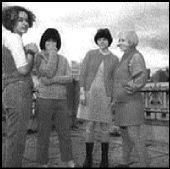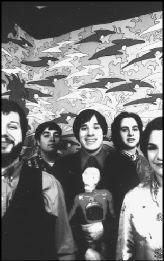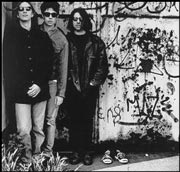K RECORDS SHOWCASE WITH DUB NARCOTIC, ALL GIRL SUMMER FUN BAND, C.O.C.O, AND IGNIS DEVOCO INDUSTRIAL FIRE CIRCUS
Local 46, 956-8372, $6 8 p.m. Sat., Feb. 9
HELLO KITTY is perhaps one of the last decade’s most subversive figures. With her huge, moon-shaped face and pudgy, formless body, she is a feminine presence in our masculine-driven popular culture, staring out from backpacks and toasters with casual indifference. It’s almost as if her expressionless, mouthless face is an active taunt to those who would prefer more guns, boobs, and blood. Kitty and her perpetually cheerful pals represent a feminist utopia—a place where everything is tinged with a fanciful, gentle sense of humor, where there is a sense of mutual cooperation and friendship between the sexes. All of this is practically unheard of in our popular culture, and the fact that this mocking exists right under the nose of the watchful Big Brother is as insurgent as it gets.
You could say the same thing about the All Girl Summer Fun Band (AGSFB). The seemingly innocuous pop purveyed by this Portland quartet just barely masks the more subversive message beneath. In a move that’s sure to vex the masculine norm of rock ‘n’ roll, AGSFB reintroduce girl culture as something unique, valuable, and worthy of respect. On their self-titled debut, just released on K Records, drummer Kathy Forster, keyboardist Kim Baxter, guitarist Jen Sbragia (also of the Softies), and bassist Ari Douangpanya promote whispered slumber party confessions, heartfelt crushes, broken hearts, and the power of all things cute and fun.
“Although people may find us ‘cute,’ I think we all have pretty strong personalities,” Foster writes in a recent e-mail interview. “We may seem shy, but we’re not too girly girl.”
“We play music that is cute and fun . . . and it’s us,” Baxter adds.
The band formed in 1998 under the motto “girls hell-bent on summer fun,” and the record solidifies that reputation. Breezy guitars contrast with upbeat brushed drums and bouncing bass; wispy vocals blend into charmingly off-key three- and four-part harmonies; and occasional keyboard melodies peek through like blades of new grass. Along with the obvious influence of K stalwarts like Heavenly, Tiger Trap, and Go Sailor, there are hints of 1960s girl groups, from the Cookies to the Shangri-Las to the Shirelles.
But unlike their predecessors, AGSFB’s use of humor allows more rebellious ideas about power to slide in undetected. “Later Operator” weaves familiar playground rhymes in with adult sexuality, managing to be both innocent and naughty: “My boyfriend never shaves/My boyfriend rarely bathes/ He’s got surfer magazines he’ll always save/But he’s a damn good . . . /Later operator!” Tracks like “Canadian Boyfriend” and “Cell Phone” humorously describe the inane things one does for love, while at the same time twisting the traditional structure of the girl pop love song. The protagonists in these narratives are not victimized by their crushes—there is none of the “I’ll die without him” sentiment of the ’60s. Instead, these girls poke fun at themselves for even succumbing to his charms in the first place.
Sbragia says “We are not a 1960s tribute band, but it would be impossible to avoid how that music has influenced me. I like to think of us as taking up where bands like Tiger Trap left off. We just want to make music, have fun, and inspire other girls to make music.”
As it turns out, this idea of inspiring other girls may be the most subversive element of what AGSFB do. Baxter, Foster, Sbragia, and Douangpanya have no reservations about admitting who their audience is. In fact, they seem almost dedicated to the idea of being role models for other girls and women inclined toward rock ‘n’ roll. Like the colorful, capricious world of Hello Kitty, AGSFB exist for the pleasure and indulgence of those with an interest in the fun elements of girl culture. Their presence onstage relegitimizes girls in pop music.
“I think [our gender] is an advantage,” Foster says. “[Being an all-girl band] helps to encourage other girl and women musicians to play. It shows everyone that girls can be serious musicians and [they can] form a band that is really good and fun. I think it’s important for this to keep happening.”








